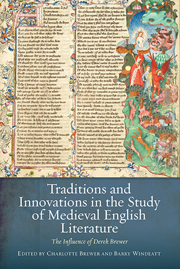 Traditions and Innovations in the Study of Medieval English Literature
Traditions and Innovations in the Study of Medieval English Literature Book contents
- Frontmatter
- Contents
- List of Contributors
- Acknowledgements
- Note on References
- Introduction: A Modern Medievalist's Career
- 1 Derek Brewer: Chaucerian Studies 1953–78
- 2 Brewer's Chaucer and the Knightly Virtues
- 3 Class Distinction and the French of England
- 4 Time in Troilus and Criseyde
- 5 Virtue, Intention and the Mind's Eye in Troilus and Criseyde
- 6 Falling in Love in the Middle Ages
- 7 The Idea of Feminine Beauty in Troilus and Criseyde, or Criseyde's Eyebrow
- 8 ‘Greater Love Hath No Man’: Friendship in Medieval English Romance
- 9 Gowerian Laughter
- 10 Derek Brewer's Romance
- 11 Malory and Late Medieval Arthurian Cycles
- 12 The Ends of Storytelling
- 13 Manuscripts, Facsimiles, Approaches to Editing
- 14 Words and Dictionaries: OED, MED and Chaucer
- 15 Afterlives: The Fabulous History of Venus
- Afterword: Derek Brewer: with ful deuout corage
- Bibliography
- Index
- Tabula in Memoriam
14 - Words and Dictionaries: OED, MED and Chaucer
Published online by Cambridge University Press: 05 September 2013
- Frontmatter
- Contents
- List of Contributors
- Acknowledgements
- Note on References
- Introduction: A Modern Medievalist's Career
- 1 Derek Brewer: Chaucerian Studies 1953–78
- 2 Brewer's Chaucer and the Knightly Virtues
- 3 Class Distinction and the French of England
- 4 Time in Troilus and Criseyde
- 5 Virtue, Intention and the Mind's Eye in Troilus and Criseyde
- 6 Falling in Love in the Middle Ages
- 7 The Idea of Feminine Beauty in Troilus and Criseyde, or Criseyde's Eyebrow
- 8 ‘Greater Love Hath No Man’: Friendship in Medieval English Romance
- 9 Gowerian Laughter
- 10 Derek Brewer's Romance
- 11 Malory and Late Medieval Arthurian Cycles
- 12 The Ends of Storytelling
- 13 Manuscripts, Facsimiles, Approaches to Editing
- 14 Words and Dictionaries: OED, MED and Chaucer
- 15 Afterlives: The Fabulous History of Venus
- Afterword: Derek Brewer: with ful deuout corage
- Bibliography
- Index
- Tabula in Memoriam
Summary
One of the distinctive features of Derek Brewer's criticism was its close and consistent grounding in the details of the texts he wrote about, particularly the denotations and connotations of individual words: the range of meanings carried by words like sovereignty, serve, honour, truthe, for example, or the implications of the use of pronouns of address and of personal names. Throughout his published writings, Brewer drew on definitions and quotations from the OED, and he had a personal connection with that dictionary too – partly through his acquaintance with one of its four original editors, C. T. Onions (Fellow and librarian at Brewer's undergraduate college, Magdalen), and partly as enthusiastic contributor of many quotations to the twentieth-century OED Supplement edited by R. W. Burchfield, another Magdalen member.
Brewer's college tutor was C. S. Lewis, whose interest in philology and word-study is attested by all his published works and who clearly exerted a great influence on Derek. In particular, Lewis's Studies in Words is a work that draws on quotations and etymologies to probe and illustrate the meanings of words just as do the OED and MED; published in 1960, it is the product of many years' reading and study, some of which would have been accomplished during Brewer's time at Magdalen (see Introduction: 10; Brewer 1979b and 2006a).
- Type
- Chapter
- Information
- Traditions and Innovations in the Study of Medieval English LiteratureThe Influence of Derek Brewer, pp. 215 - 261Publisher: Boydell & BrewerPrint publication year: 2013
